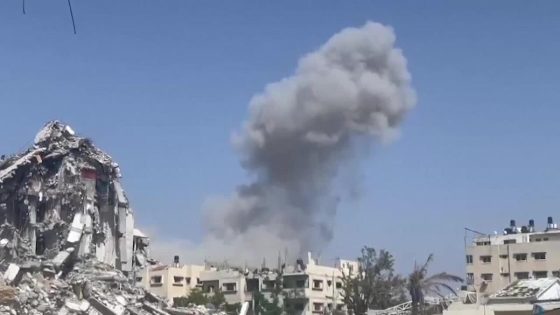This First Person article is written by Golshan Abdmoulaie, who lives in Toronto. For more information about First Person stories, see the FAQ.
I settled into my seat at Toronto’s TIFF Lightbox theatre, a tub of popcorn in one hand and a strong IPA in the other. Surrounded by my Iranian filmmaker friends, I felt a sense of belonging and anticipation as we prepared to watch No Bears, the latest film from Jafar Panahi, about a couple attempting to flee Iran’s oppressive regime. Given the events unfolding in the country at that time, attending the screening felt like a natural thing to do.
Sometimes, all it takes is one moment — an image, a conversation, or a film — to unlock buried feelings. As the film unfolded, I could feel a shift in my body. No longer did I feel at ease or comfortable in the dark theatre. Tears rolled down my face; I wanted to flee.
Panahi’s poignant portrayal of the struggles faced by Iranians living in immigration limbo stirred something within me. I felt as though the weight of my own displacement as a child refugee fleeing Iran in 2022 was colliding with the ongoing turmoil of the Jin Jiyan Azadi (Woman, Life Freedom) movement of 2022, which started with the death of 22-year-old Mahsa Amini for violating Iran’s hijab law.
In the months before the film screening, I had become consumed by the drive to do something, anything, to support the cause of freedom and justice for the Iranian people. I attended protests, engaged in heated debates online, helped organize community meetings and put together a list of therapists in the Greater Toronto Area who could provide support.
9:21Protesting led to my burnout. That’s when I realized self-care could be my act of defiance
Golshan Abdmoulaie was burned out from months of protesting the Iranian government. So she started spending more time in nature and seeking out places of rest and beauty as a way to heal.
Fuelled by rage, I went into a frantic mode and was constantly posting content on social media. I spent most of my days in a cycle of despair and hopelessness as I saw images of protesters being shot or read announcements of executions and mass arrests. I was haunted by clips of grieving mothers wailing over the deaths of their children at their gravesites.
I recall responding to people’s expressions of worry for me by saying, “I was raised for this. My parents were activists.”
My mother and father lived and protested during the Iranian Revolution of 1979. It brought nothing but horror with it and, shortly after, Iraq invaded Iran and war began. Due to the uncertainty this caused, my family fled to India, where we waited for three years before being granted asylum in Canada.
After we arrived, our family including aunts, uncles and cousins, began seeking out places of rest and beauty as a way to heal. My first trip after arriving in Toronto was to Sandbanks Provincial Park on the shores of Lake Ontario, and we spent my childhood travelling to campgrounds around the province. I didn’t realize this as a child, but my parents were teaching me core values of self-care — resting in nature with family and loved ones can be transformative and a source of deep joy.

But these were lessons I needed to be reminded of when my activism reached new levels in 2022.
And amidst the chaos, eight months after the protests started I found myself facing a different kind of battle: burnout. That relentless cycle of despair and anger, coupled with the overwhelming sense of helplessness, began to engulf me.
That night at the theatre, after I returned home and succumbed to tears, I descended into a deep depressive episode and a state of undefinable grief. Part of my world was falling apart and it seemed the world was carrying on as if nothing was happening. I felt so disconnected from everything around me that I couldn’t make any space for hope or grace.

I removed myself from social media and returned to what I had learned as a child camping with my parents — I sought solace in nature. There was no single moment where I consciously willed myself back to joy. Instead, it happened naturally over several months.
As winter transitioned into the technicolour of spring, I began seeing clearly again, noticing how trees bow to say hello in the wind or the slow meditation of a snail laying on a leaf. I started to hike, garden and write poetry again.
I realized that In a world consumed by chaos and conflict, my pursuit of justice came at the cost of my well-being. I felt a constant demand to be productive, obedient and to participate. Taking the time to rest and recharge became my radical act of defiance. Saying “no” to these demands created space to work toward justice from a place of clarity.
Clinical psychologist Dr. Taslim Alani-Verjee defines burnout symptoms — and what you can do to combat them.
This phase of deep rest and recovery became my form of activism and resistance – a refusal to die a slow emotional death so I can be well to take care of my community and be of service.
In 2016, I bought a house in Prince Edward County a short drive from my first Canadian camping trip at Sandbanks. The one-acre property overlooks a bay home to a flock of over 50 swans, who look like tiny angels from a distance. Sometimes bald eagles will fly by or a family of foxes will visit. The space has become a sanctuary for myself, my family and my community. As I look out over the bay, I am reminded of the power of respite and its ability to heal, rejuvenate and empower.
Do you have a compelling personal story that can bring understanding or help others? We want to hear from you. Here’s more info on how to pitch to us.
Source Agencies





